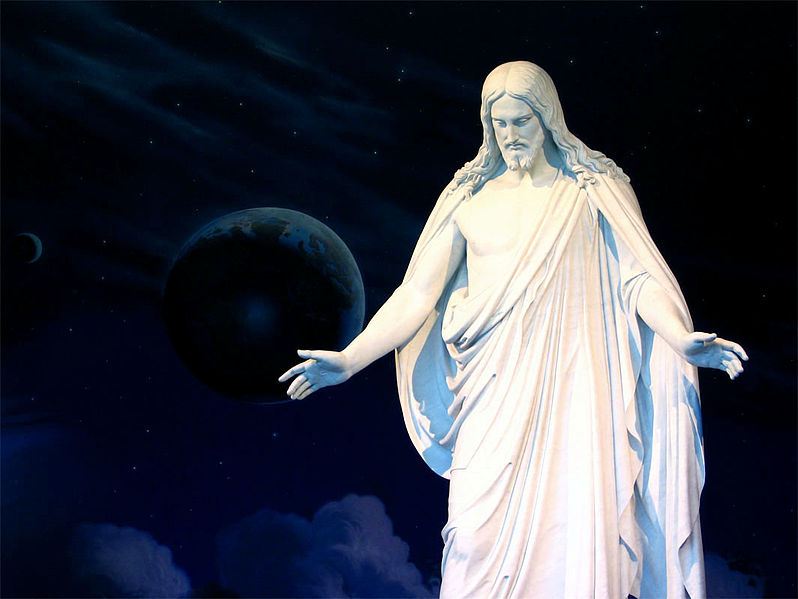
This post is a part of the interfaith blog roundtable on at Patheos, hosted by Chris Henrichsen, on the question, “Are Mormons Christian?”
I am not so sure that, if what we mean by ‘Christian’ is the dual belief in Christological and Trinitarian mysteries, that it is meaningful for a Mormon to call herself a Christian.
I am not a Muslim, if what we mean by ‘Muslim’ is the belief that Muhammad is the prophet of God — Allah, in arabic. I do belief in Allah, however, as do Mormons and Jews, but the details beyond the generic, Abrahamic genre, reveal significant differences in what has become the ordinary language of those traditions.
Perhaps a better question is this: Why would a Mormon want to be a Christian?
Those answers are not mine to give, since I am not a Mormon. To many Christians, mind you, I am not a Christian either. However, there is a significant genealogy that makes that claim historically absurd.
*
One aspect Catholics and Mormons share is a belief in the open canon of tradition. Mormons are more Catholic than Protestant in this regard. The Mormon tradition has acquired many significant texts since its genesis in the early 19th century, and it has changed many of its formerly held doctrines. This is an important feature of Mormonism because it opens the possibility for the opening doubt to be addressed rather straightforwardly.
Mormonism could simply change or clarify. There is a deep sense of pragmatism in the Mormon tradition. Or maybe it’s just youth. Maybe both. Who knows?
Given the amount of back and forth in the first few centuries of the Early Church (that, on a Mormon account, separated the Church from Christ’s original teachings in the Great Apostasy), it would be perfectly reasonable to foresee significant theological change to Mormon beliefs, as we have seen over the past 200 years.
*
Another issue that does arise from this question is that, on the reading of the Mormon church I acquired whilst being courted by very nice and kind LDS missionaries, Catholics are not Christians. Not exactly. It is precisely the Catholic tradition that corrupted original Christianity and required the Church of Jesus Christ of Latter-Day Saints to save what the papists screwed up.
So I am not sure why, exactly, there is any need to not entertain the possibility that Mormons may not be Christian. It is only as impolite or impolitic as their own account of the post-apostolic Church.
It may even be the case that they are right, and the truth is far more radical: Only Mormons are Christian.
Unfortunately, the terms of Christianity have been cast in very old theological molds of Christianity that is presently not the exact version that Mormons claim as their own.
*
There is the possible objection that theology does not define what the true Christian is — “They’ll know we are Christian by our love.”
Fair enough. I am very happy to live with a sense of solidarity with my Mormon brothers and sisters, and our traditions are not wholly distinct in every regard. But I am still not entirely sure that that solidarity has to be called Christian solidarity, in the ordinary (and theological) sense the term has been built to convey.
Perhaps they are “Christian,” in a different sense of the term. But at that point we’re just playing language games.
*
The evangelical traditions of Mormonism and Catholicism are well known, for better and for worse. Evangelism without (at least an implicit, but very real) theology is like recruiting people to work in a pyramid system or a ponzi scheme. There is nothing to justify the recruitment except the recruitment itself and its most superficial, but concrete rewards. All questions must either be admitted to openly (which is rarely the case because it threatens the system) or siphoned through a maze of niceties and denials and circular repetitions.
And super-nice, unobjectionable people.
If Mormonism practices global evangelical efforts, as it does, then it cannot, I think, dismiss theology as a route to avoid the question of what the exact nature of solidarity is between Catholics and Mormons. Especially when, on a Mormon reading of history, Catholics are themselves not Christian.
I am not personally offended by this view, I am simply compelled by the enormous evidence to the contrary and the complete refusal of LDS apologists to offer counter evidence freely.
*
It would seem that, in this case, Mormons who desire to be Christians can be, if they want to — if they want to bad enough to ammend their tradition, again, as most traditions do in their infancy. (And, no, it is not infantilizing to call an infant an infant; it is merely a historical fact, measured in time.)
Mormons will simply have to shift some teachings around, to accommodate the ordinary language, as is well within their privilege, and develop a thicker and more thought-out theological tradition, which should come in time. Since many Mormons seem rather dismissive about theology, it should be little discomfort to make such changes to fit into the ordinary language of Christianity.
*
I am empathetic to the Mormon church. Impressed even. It has been very successful in its first two centuries. Far most successful, I would argue, than the Early Church was in its time. And I am not so sure that the Early Church had a strong sense of itself at the same age either. But, eventually, saying “I believe in in Jesus Christ, therefore I am a Christian too” will need to be strengthened by a theology that supports it in detail and doctrine.
Maybe the best and most reasonable answer to the question, then, is “we’ll see.”
It may simply be too early to tell.











